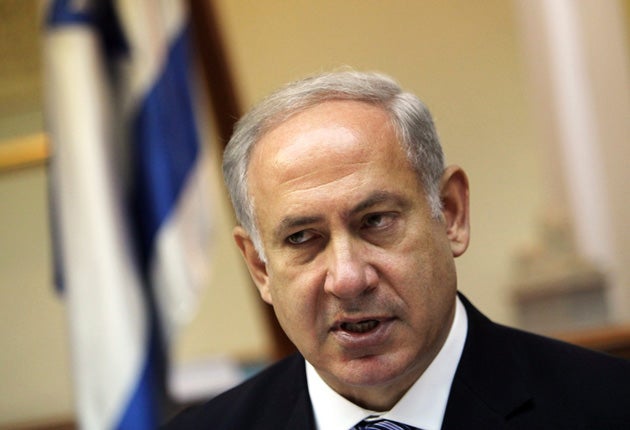Settlements on agenda for Israeli PM's visit

Your support helps us to tell the story
From reproductive rights to climate change to Big Tech, The Independent is on the ground when the story is developing. Whether it's investigating the financials of Elon Musk's pro-Trump PAC or producing our latest documentary, 'The A Word', which shines a light on the American women fighting for reproductive rights, we know how important it is to parse out the facts from the messaging.
At such a critical moment in US history, we need reporters on the ground. Your donation allows us to keep sending journalists to speak to both sides of the story.
The Independent is trusted by Americans across the entire political spectrum. And unlike many other quality news outlets, we choose not to lock Americans out of our reporting and analysis with paywalls. We believe quality journalism should be available to everyone, paid for by those who can afford it.
Your support makes all the difference.The Israeli Prime Minister, Benjamin Netanyahu, will today meet Gordon Brown before holding crucial talks tomorrow with the US Middle East envoy, George Mitchell, on Washington's call for a freeze on the building of Jewish settlements in occupied territory.
Mr Netanyahu arrived in London last night after reportedly telling his cabinet that political negotiations with the moderate Palestinian leadership, based in the West Bank city of Ramallah, could begin as soon as late September.
The Palestinian President, Mahmoud Abbas, has said he will not negotiate with Mr Netanyahu without a freeze on new Israeli settlements, but the Prime Minister indicated to ministers on Sunday that there had been "some progress" towards such an agreement in the talks with the Americans.
There has been growing speculation in Israel about an eventual compromise between the US demand for a 12-month freeze, during which there would be talks on borders of a future Palestinian state, and Israel's proposal for a six-month halt to building. One suggestion is that Israel would stop constructing settlements for nine or even 12 months, provided that work continues on 2,500 Jewish housing units deemed to be under construction in the West Bank. About 300,000 Jewish settlers now live in the disputed region.
A major outstanding sticking point, at least with the Palestinians, is the repeated insistence by Mr Netanyahu that he will not order a halt to construction of settlements in Arab East Jerusalem, over which Israel claims sovereignty. Most of the international community, including Britain, has never accepted the legality of Israel's unilateral annexation of East Jerusalem after the Six-Day War in 1967.
Israel's oldest peace campaign group, Peace Now, said work on 600 new settlement structures had started in the West Bank in the first half of this year, and warned that planning permission had been given for a total of 40,000 homes. While his government is currently stable, some of Mr Netanyahu's prominent ministers are openly dismissive of negotiations with the Palestinians. His controversial Foreign Minister, Avigdor Lieberman, himself a West Bank settler, said he was "willing to bet that there won't be peace in another 16 years ... certainly not on the basis of the two-state solution".
The Palestinian issue is likely to dominate Mr Netanyahu's talks with Mr Brown, along with Iran. Mr Netanyahu is expected to press his view that tougher sanctions in the near future would help to obviate a more draconian response to Tehran's alleged nuclear weapons programme later. Such a response includes a military strike – an option Israel has not ruled out.
Mr Netanyahu, accompanied by his wife Sara, will not meet the Foreign Secretary, David Miliband, or the Tory leader, David Cameron.
Join our commenting forum
Join thought-provoking conversations, follow other Independent readers and see their replies
Comments